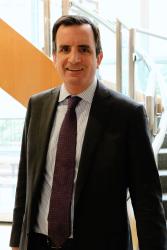

9:00 am EDT - 10:30 am EDT
Past Event
Over the past few decades, China has carved out an increasingly influential role for itself in global affairs. The country has expanded its economic and diplomatic outreach, both bilaterally and by becoming a more active participant in multilateral organizations. On July 29, the Foreign Policy program at Brookings hosted a panel of regional experts for a webinar to discuss the changing dynamics and international responses to China’s growing global activism. The panel was largely comprised of contributing authors to an installment of Brookings papers on China’s regional influence and strategy, released as part of the series titled “Global China: Assessing China’s Growing Role in the World.”
Brookings Interim Vice President of Foreign Policy Suzanne Maloney introduced the keynote speaker, Lisa Curtis, deputy assistant to the president and senior director for South and Central Asia at the National Security Council. Curtis offered a comprehensive overview of U.S. policy toward China, describing how the U.S. has reevaluated its global strategy as China seeks to advance its own interests around the world. She noted that even as the United States has become more tolerant of friction with China, “we welcome cooperation where interests align.” She also outlined how American and Chinese interests intersect in South and Central Asia and the steps the United States is taking to protect its interests in these regions.
Following Curtis, DL McNeal — formerly the associate director of Brookings’s China Center and now managing director of Longview Global — moderated a panel discussion on regional responses to China’s growing external activism. Panelists analyzed how various countries have sought to balance their political interests with their economic ties to China, especially given rising tensions in the U.S.-China relationship.
Ted Piccone, nonresident senior fellow in the Brookings Foreign Policy program, discussed China’s economic engagement with Latin American and Caribbean countries. He explained that China came into the region about 15 to 20 years ago as part of a global strategy, and that complementary economic interests propelled China’s relations with the region during “that first honeymoon period,” but have become “a lot more complicated.”
Thomas Wright, director of the Center on the United States and Europe at Brookings, offered his perspective on how Europe has responded to China’s increasing assertiveness. He highlighted the region’s economic relationship with China, but remarked that Europe is beginning to “think about their strategic options,” and in the future there may be “more push back, but one key difference from the U.S. is it will have almost nothing to do with kinetic military power.”
SK-Korea Foundation Chair in Korea Studies and Senior Fellow in the Center for East Asia Policy Studies at Brookings Jung Pak described South Korea’s careful balancing act between the United States and China. She noted that South Korea has a deep history with China and is not “new to this kind of conflict and cooperation.” Nevertheless, as competition between the U.S. and China intensifies, there may be “more pressure on South Korea from China to bend to China’s preferences.”
Finally, Natasha Kassam, research fellow at the Lowy Institute, offered insight into Australia’s changing relationship with China. She commented that recent reports of Chinese interference in Australia’s domestic affairs have caused trust in China to “halve in the last two years,” a trend that has tracked the broader decline in the overall bilateral relationship.
Throughout the discussion, each panelist discussed how their countries and regions of expertise have been pursuing strategies to balance economic interests against political and security concerns with China. The panelists also offered insights into how intensifying U.S.-China tensions may sharpen many governments’ choices in how they manage relations with China going forward, understanding that China will continue to emerge as a global power.
9:00 am - 9:05 am
9:05 am - 9:35 am
9:35 am - 10:30 am
Panelist




Ling Chen, Ryan Hass, Jennifer Kavanagh, Michael E. O’Hanlon, Bruce Jones, Mireya Solís, Thomas Wright
July 2, 2025

Pavel K. Baev, Robert Einhorn, Sharan Grewal, Samantha Gross, Ryan Hass, Patricia M. Kim, Elizabeth N. Saunders, Yun Sun, Caitlin Talmadge, Shibley Telhami, Andrew Yeo
July 1, 2025

Ryan Hass
July 1, 2025